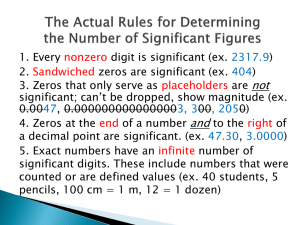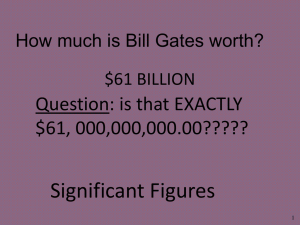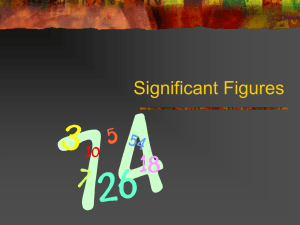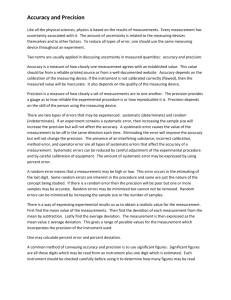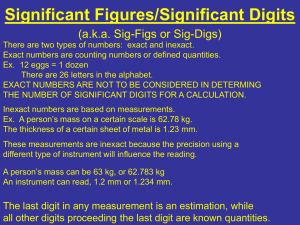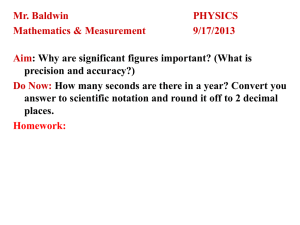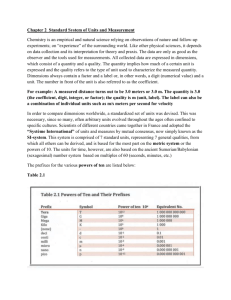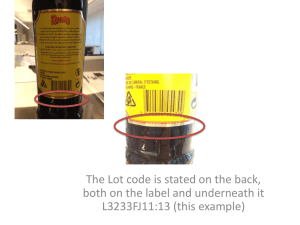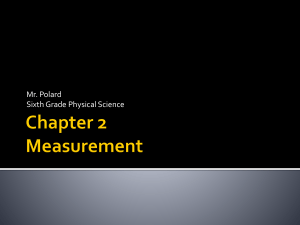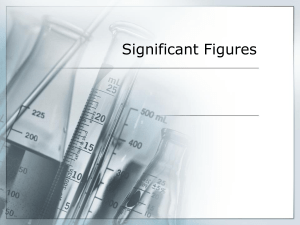Accuracy & Precision - Duarte Unified School District
advertisement
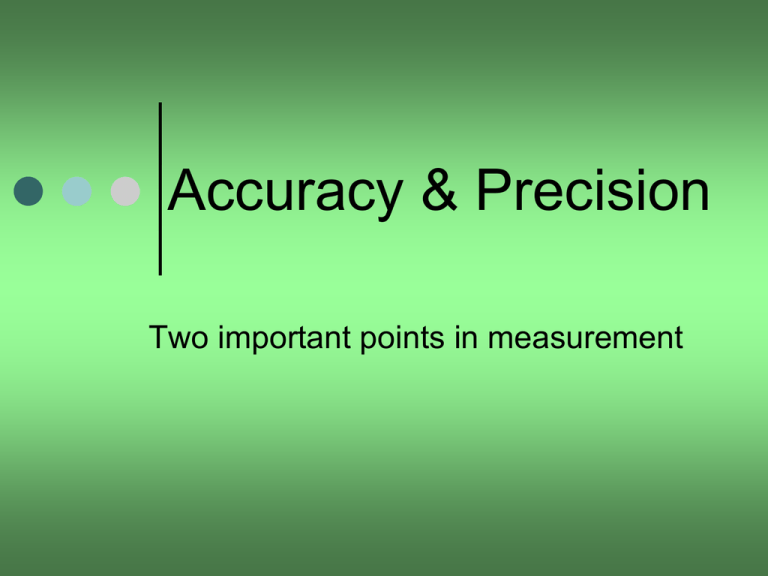
Accuracy & Precision Two important points in measurement Accuracy and Precision At the conclusion of our time together, you should be able to: 1. Explain the difference between the accuracy and precision 2. Give examples of accuracy and precision Accuracy Accuracy = the extent to which a measured value agrees with a standard value Accuracy of a device must be checked Does it read a proper accepted value? Beware of Parallax – the apparent shift in position when viewed at a different angle. Graduated Cylinder – Meniscus and Parallax Example: Accuracy Who is more accurate when measuring a book that has a true length of 17.0 cm? Susan: 17.0 cm, 16.0 cm, 18.0 cm, 15.0 cm Amy: 15.5 cm, 15.0 cm, 15.2 cm, 15.3 cm Murphy's Laws of Science and Technology Technology is dominated by those who manage what they do not understand. Precision Precision = the degree of exactness of a measurement that is repeatedly recorded. Which set is more precise? 18.2 , 18.4 , 18.35 17.9 , 18.3 , 18.85 16.8 , 17.2 , 19.44 Example: Precision Who is more precise when measuring the same 17.0 cm book? Susan: 17.0 cm, 16.0 cm, 18.0 cm, 15.0 cm Amy: 15.5 cm, 15.0 cm, 15.2 cm, 15.3 cm Accuracy vs. Precision High Accuracy High Precision High Precision Low Accuracy Can you hit the bull's-eye? Three targets with three arrows each to shoot. How do they compare? Both accurate and precise Precise but not accurate Neither accurate nor precise Can you define accuracy vs. precision? Why Is There Uncertainty? • Measurements are performed with instruments, and no instrument can read to an infinite number of decimal places •Which of the instruments below has the greatest uncertainty in measurement? The Scientific Method begins with Questions about the World Around You. Ever Wonder Why?... Braille dots are on the keypads of drive-up ATM's? Accuracy and Precision Let’s see if you can: 1. Explain the difference between the accuracy and precision 2. Give examples of accuracy and precision Exit Quiz: Evaluate whether the following are precise, accurate or both. Low Accuracy Low Accuracy High Accuracy Low Precision High Precision High Significant Figures In Measurements Significant Figures At the conclusion of our time together, you should be able to: 1. Explain what significant figures are in a measurement 2. Determine the number of significant figures in any measurement Significant Figures The significant figures in a measurement include all of the digits that are known, plus one last digit that is estimated. The numbers reported in a measurement are limited by the measuring tool. How many sig figs are there in a given measurement? Measurement and Significant Figures Every experimental measurement has a degree of uncertainty. The volume, V, at right is certain in the 10’s place, 10mL<V<20mL The 1’s digit is also certain, 17mL<V<18mL A best guess is needed for the tenths place. To indicate the precision of a measurement, the value recorded should use all the digits known with certainty, plus one additional estimated digit that usually is considered uncertain by plus or minus 1. No further insignificant digits should be recorded. The total number of digits used to express such a measurement is called the number of significant figures. All but one of the significant figures are known with certainty. The last significant figure is only the best possible estimate. Below are two measurements of the mass of the same object. The same quantity is being described at two different levels of precision or certainty. 15 Helpful Hints On The Lab Report from Mr. T’s Vast Lab Experience!!! Hint #5. A record of data is essential. It fools the instructor into thinking that you were working. Reading a Meterstick . l2. . . . I . . . . I3 . . . .I . . . . I4. . First digit (known) = 2 cm 2.?? cm Second digit (known) = 0.7 2.7? cm Third digit (estimated) between 0.05- 0.08 cm Length reported 2.77 cm = or 2.76 cm or 2.78 cm Known + Estimated Digits In 2.77 cm… • Known digits 2 and 7 are 100% certain • The third digit 7 is estimated (uncertain) • In the reported length, all three digits (2.77 cm) are significant including the estimated one Learning Check . l8. . . . I . . . . I9. . . . I . . . . I10. . What is the length of the line? 1) 9.31 cm 2) 9.32 cm 3) 9.33 cm How does your answer compare with your neighbor’s answer? Why or why not? cm Zero as a Measured Number . l3. . . . I . . . . I4 . . . . I . . . . I5. . What is the length of the line? First digit Second digit Last (estimated) digit is 5.?? cm 5.0? cm 5.00 cm cm Always estimate ONE place past the smallest mark! 11.5 mL So how many sig figs are there in a given measurement? 52.8 mL Be Wary of Wealth and Success!! Charles Schwab, president of the largest steel company, died a pauper. Edward Hopson, president of the largest gas company, became insane. Richard Whitney, president of the New York Stock Exchange, was released from prison to die at home. Cosabee Rivermore, the Great Bear of Wall Street, died of suicide. Be Wary of Wealth and Success!! Gene Sarazan, the U.S. Open and the PGA Golf Tournaments Champion, went on to live a full and happy life playing golf and remaining solvent. Conclusion: Stop worrying about business and start playing more golf!! How to Determine Significant Figures in a Problem Use the following rules: Rule #1 Every nonzero digit is significant Examples: 24 = 2 3.56 = 3 7 =1 Rule #2 – Sandwiched 0’s Zeros between non-zeros are significant Examples: 7003 = 4 40.9 = 3 Rule #3 – Leading 0’s Zeros appearing in front of non-zero digits are not significant • Act as placeholders • Can’t be dropped, show magnitude Examples: 0.00024 = 2 0.453 =3 Rule #4 – Trailing 0’s with DP Zeros at the end of a number and to the right of a decimal point are significant. Examples: 43.00 = 4 1.010 = 4 1.50 = 3 Rule #5 – Trailing 0’s without DP Zeros at the end of a number and to the left of a decimal point aren’t significant Examples: 300 = 1 27,300 = 3 Easier Way to do Sig Figs!! • Pacific/Atlantic P A If a decimal point is present, start on the Pacific (P) side and draw an arrow through the number until you hit a non-zero digit. Count all numbers without an arrow through them. If a decimal is absent, start on the Atlantic (A) side and draw an arrow through the number until you hit a non-zero digit. Examples: 123.003 grams decimal present, start on “P” side, draw arrow, count digits without an arrow through it. Answer = 6 10,100 centimeters Decimal absent, start on “A” side, draw an arrow, count digits without an arrow through it. Answer = 3 Learning Check State the number of significant figures in each of the following: A. 0.030 m 1 2 3 B. 4.050 L 2 3 4 C. 0.0008 g 1 2 4 D. 3.00 m 1 2 3 E. 2,080,000 bees 3 5 7 Learning Check A. Which answer(s) contain 3 significant figures? 1) 0.4760 2) 0.00476 3) 4760 B. All the zeros are significant in 1) 0.00307 2) 25.300 3) 2.050 x 103 C. 534,675 rounded to 3 significant figures is 1) 535 2) 535,000 3) 5.35 x 105 Learning Check In which set(s) do both numbers contain the same number of significant figures? 1) 22.0 m and 22.00 m 2) 400.0 m and 40 m 3) 0.000015 m and 150,000 m
